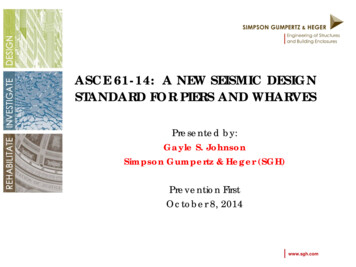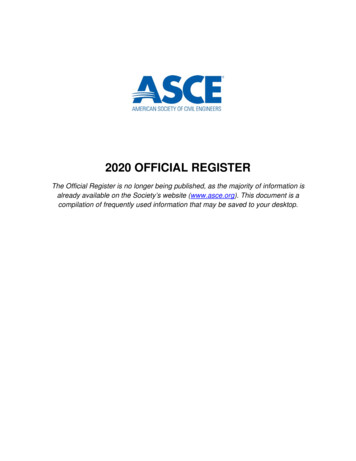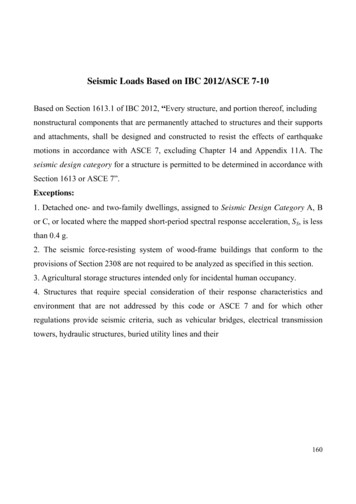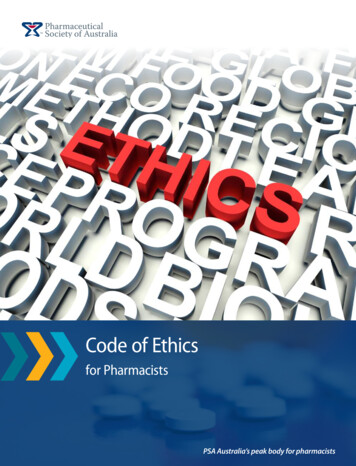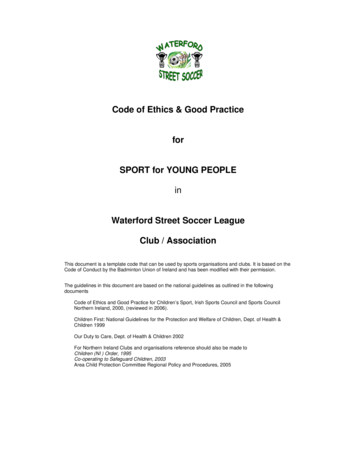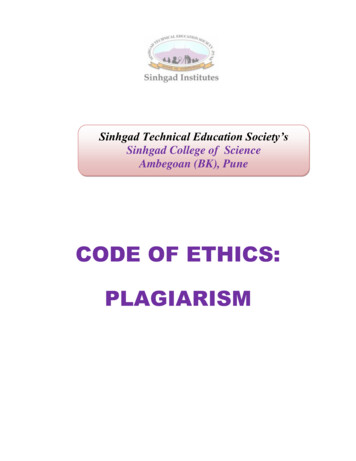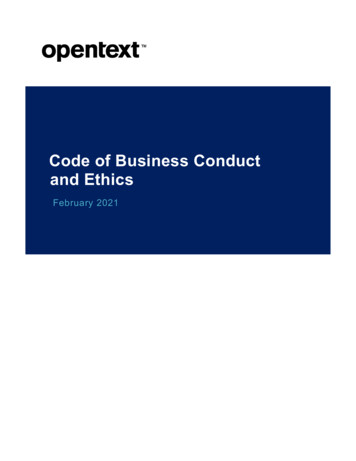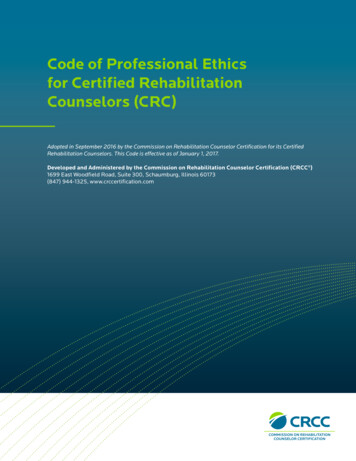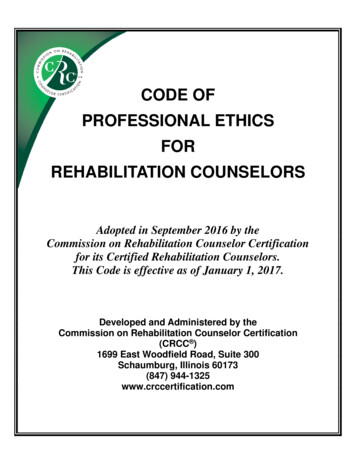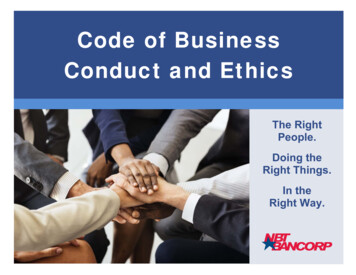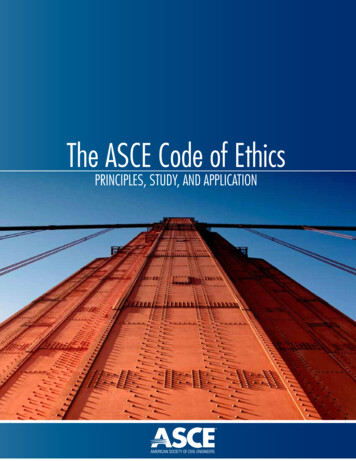
Transcription
The ASCE Code of EthicsPRINCIPLES, STUDY, AND APPLICATIONTHE ASCE Code of Ethics Principles, Study, and Application1
AcknowledgmentsThis guide was written and compiled by Mr. Eric L.Flavell, P.E., F.ASCE as a gift to the Society and theprofession so that we can continue to earn the public’strust as we work to improve our quality of life. Help andsupport were provided by the Committee on ProfessionalPractice, the Committee on Business Practices, and aBlue Ribbon Panel to review the relevancy, content, andquality of this document.ASCE Committee on Business Practicesof the Committee on Professional PracticeCharles D. Anderson, P.E., M.ASCE, Chair, 2011Michael F. Garrett, P.E., M.ASCE, Chair 2008-2009Eric L. Flavell, P.E., F.ASCE, Chair 2006-2007Gregg E. Brandow, Ph.D., P.E., S.E., M.ASCEAndrew V. Brozyna, P.E.Melissa M. Carter, P.E., M.ASCEFran Eide, P.E., M.ASCEScott M. Rosemann, P.E., M.ASCEBlue Ribbon PanelRachelle Hollander, Ph.D.Paul Munger, Ph.D., P.E., F.ASCEBob Nichols, P.E., F.ASCE2THE ASCE Code of Ethics Principles, Study, and Application
Table of ContentsIntroduction to ASCE’s Code of Ethics . . .4Part 1 – Discussion on Ethics . .5Part 2 – ASCE Code of Ethics . .18Part 3 – Guidelines to Practice . .20THE ASCE Code of Ethics Principles, Study, and Application3
INTRODUCTION TOASCE’s CODE OF ETHICSWelcome to ASCE’s Code of Ethics. The Code of Ethics,as you will come to understand, is the foundation of theapplication of the civil engineering profession to the clientand the public at large. Civil engineering is technicalby nature, often involving complex concepts, evaluation,calculation, and design to implement a project. The otherside of civil engineering is our interface with people,including the public, clients, reviewing agencies, and allthe other people we impact with our work. This interface iswhere ethics comes into play.This presentation of ASCE’s Code of Ethics discusses whata code of ethics is and how it applies to one’s professionaland personal life. A series of questions is presented thatexplores the essence of ethics and how it relates to ourlives. The questions are intended to be diverse and toexplore many aspects of ethics, but are by no means allinclusive. In fact, they are really just a starting point for yourpersonal journey to understanding and applying ethics toeveryday life.The format of this document starts with the question and answer portion. It is intended for those new to ethics as well asthose who have been learning and applying ethics all their lives. The questions are intended to be thought provoking, withpurposely short and concise responses. Each of these questions could be the source of extensive discussion. The intent isto expose the reader to the breadth of ethics, the importance of ethics, and to start the process of a serious and in-depthreflection and evaluation of ethics and how it applies to all aspects of life, both private and professional.Once the reader has the opportunity to explore and understand some basic concepts of ethics, the second part of thedocument focuses specifically on ASCE’s Code of Ethics. The ASCE Code of Ethics is comprised of fundamental principlesand fundamental canons. The third part of the document discusses the application of the fundamental principles andfundamental canons to current engineering practice. This part is made up of the “Guidelines to Practice,” which are morelike laws derived from the fundamental principles and fundamental canons. They provide specific examples of how eachcanon is applied to assist members with implementation of the Code of Ethics and how they form the basis of evaluationfor disciplinary action for those who violate the Code of Ethics. Bear in mind that the guidelines are clarifications anddiscussions of specific issues, and are not in any way intended to be all-inclusive. They are merely implementation of theappropriate interpretation of the fundamental principles and fundamental canons to specific issues. A violation is based on aviolation of fundamental principles and fundamental canons, and that is how ASCE will evaluate an infraction and disciplinethe offender if an ASCE member.While the fundamental principles and fundamental canons will likely change little, the guidelines are the living portion ofthe Code of Ethics. They will adjust to the changes in the profession and society as a whole and provide clarification of theapplication of the Code of Ethics.4THE ASCE Code of Ethics Principles, Study, and Application
PART 1 – DISCUSSION ON ETHICSDefinitionsFrom Webster’s Dictionary, the definition of “Ethics” is:(1929 Edition) – Science of duty and morality(1953 Edition) – Science of ideal human character(2007 Edition) – Principles of conduct governing an individual or a groupFrom Webster’s Dictionary, the definition of “Character” is:(1929 Edition) – Moral force or qualities(1953 Edition) – Moral vigor or firmness especially acquired through self-discipline(2007 Edition) – The complex of mental and ethical traits marking and oftenindividualizing a person, group, or nationWhat is a Code of Ethics?A code of ethics is a basic set of values and behaviors that are intended to be embraced byusers so they conduct themselves responsibly, in an irreproachable manner, with honor andintegrity. A code of ethics is typically based on simple concepts that are of value to societyas a whole, promote good behavior, foster trust, and result in respect of one another. A codeof ethics should be easy to understand, and written in general terms so it can be applied toevery situation.Why do we need a Code of Ethics?A code of ethics is a document that serves as a reference from moral guidelines. It is used toinspire members to be ethical in their everyday pursuits. It works to define the moral aspectsof being a professional and serves as a checklist of good behavior and desired attributes. Ifit is referenced regularly, it will raise consciousness and awareness of the moral obligationsof a professional. It can serve as the basis of discipline for undesirable behavior. It can alsobe used as a resource when one is faced with a situation that involves moral perplexity oruncertainty. It sets a standard for professional behavior bound by the code that colleagues,the public, clients, and employees can expect.The ASCE Code of Ethics is focused toward three constituencies:1. The public,2. The client and employer, and3. Licensed civil engineers.It is important to maintain a balance of responsibilities among the three, not only becauseof the realities of the work environment, but to sustain the “learned professional” status thatenables practitioners to function as professional engineers (e.g., make considered judgmentsand decisions in the absence of complete information) and over the long term provide abenefit to the public.THE ASCE Code of Ethics Principles, Study, and Application5
How should a Code of Ethics be used?Because of the complexities of life, the application of a code of ethics can be complicated,and requires that one carefully evaluate all of the issues associated with the problem at hand.The purpose of the Code of Ethics is to provide guiding principles to help the individualdecide what actions will be appropriate and therefore supported by the Code of Ethics. Areview of the Code of Ethics and the fundamental principles discussed in the code shouldhelp you sort through the issues and determine what is ethical and what is unethical. Trustedcolleagues may assist with this process, as can the ethical analytical tools presented in thisdocument. When developing solutions to an issue based on applying the Code of Ethics, thegoal should be to develop an approach and solution that is above reproach, handled withhonor and implemented with integrity.The Code of Ethics will not make a decision for you. It will provide founding principlesfor you to apply when you evaluate a problem, reason a conclusion, and take action.The decisions you make and the actions you take are yours alone, and you alone will beresponsible for those decisions, regardless of the input given to you by others.Stated in modern terms, a common test is the “60 Minutes” or publicity test. Simply stated,if your actions and response to a particular issue or situation were discussed and presentedon the T.V. show “60 Minutes” or some other investigative reporting program, would you beproud of how you handled it, or would you want to hide and never be seen again?Where does ethics come from?Ethical behavior was codified to provide guidelines for fairness and integrity in one’sendeavors within a societal framework. The highest level a society can reach is one inwhich everyone treats one another with respect and does only what is in the best interestof society as a whole — as an individual decision, without coercion. The societies withthe most freedom and the greatest thinkers value treating others with respect and doing the“right thing” in all situations as the highest attainable attribute an individual could achieve.Aristotle’s view, expressed in his book, the Nicomachean Ethics, was that ethics is a moralvirtue in an individual through training and practice.The codification of ethics has taken many forms: from the Ten Commandments, to theDoctrine of Socrates, to Nicomachean Ethics, to the Code of Hammurabi, to the AmericanConstitution, to the Golden Rule, to the ASCE Code of Ethics. The ASCE Code of Ethics istailored to the professional civil engineer.Between 1877 and 1914, the Society’s Board of Direction was very conservative andbelieved that ethics was a matter of an engineer’s personal responsibility and honor andnot appropriate for a written code. In 1914, however, a special committee of the Board ofDirection was appointed to draft a Code. The original Code contained six principles but hasbeen amended over time to its current form. Proposed amendments must be published to themembership and then approved by a two-thirds vote of the Board of Direction.6THE ASCE Code of Ethics Principles, Study, and Application
How does the Code of Ethics apply to my professional life?As a civil engineer you have been trained to design and oversee construction of variousimprovements to enhance civilization, growth, and society as a whole. In the course ofmaking the decisions that will be required to plan, design, and oversee construction, youwill be faced with many moral and ethical dilemmas. Many decisions will be made withregard to safety, public interest, and client interest. Having a code of ethics will help youmake those decisions. As a professional your work is restricted by society such that onlythose having the training and proven credentials may perform it, limiting competition toonly those individuals who are licensed. In return, professionals are required to performtheir work to high ethical standards and always in consideration of and to the benefit of thepublic. Professionals are held to a higher standard than the general public, and the Codeof Ethics provides the guidelines and standards that the professional engineer must follow tosatisfy that commitment.How does ethics apply to my personal life, outside of myprofessional life?Ethical behavior is a way of conducting one’s life, not a measure of adherence to aspecified set of arbitrary rules. Because an engineering professional is a professionaltwenty-four hours each day, seven days each week, all year long, ethical behavior shouldbe a way of life, not just applied to a job. A misguided action or comment from anengineering professional is just as detrimental, whether rendered at work or on vacation.When one accepts the responsibilities associated with special engineering training and aprofessional career, one also accepts the responsibility to conduct life within a frameworkof norms and behaviors that won’t diminish the trust that society places in the engineeringprofession.Is everyone’s ethical focus the same?Unfortunately the answer to this question is no. Although ethics should be a priority foreveryone, and especially for professionals, not everyone is focused on ethics. Thoseindividuals who are looking for personal challenge, responsibility, and self-improvementwill find that focusing on ethics and applying ethical behavior to their lives will promotepersonal growth.If everyone practiced ethical behavior all the time, there would be no need for laws. Youwill meet a variety of people throughout your life and you will be faced with decisions,including determining who your friends, leaders, and mentors are. Selecting leaders andmentors with strong understanding and demonstration of ethical behavior will help youdevelop into a person of character and deserving of respect.How do you judge another’s implementation of ethics?One must always be careful when judging others. The intent of ethical behavior is personalgrowth and betterment as an individual. The evaluation of others to determine who can andwho cannot be trusted, who has honor and who does not, or who has integrity and whodoes not, is acceptable as a method to learn from others’ behavior. Evaluating these traitscan also serve to protect yourself and others from those who would harm you. It is alwaysbetter to be a good example and leave the judging to others.THE ASCE Code of Ethics Principles, Study, and Application7
Why is ethics important?Ethics is important because it forms the foundation of your belief system. It governs how youtreat others; it is the basis of your decision-making process and how you react in varioussituations. Because of its societal value, ethics is revered by others and held in high esteem.How does ethics impact leadership?Traits of a successful leader include trustworthiness, respect of others, and integrity. Theimplementation of ethical practices in your lifestyle is one way to develop a foundation to buildstrong relationships with others. The b
Constitution, to the Golden Rule, to the ASCE Code of Ethics. The ASCE Code of Ethics is tailored to the professional civil engineer. Between 1877 and 1914, the Society’s Board of Direction was very conservative and believed that ethics was a matter of an engineer’s personal responsibility and honor and not appropriate for a written code. In 1914, however, a special committee of the Board of
